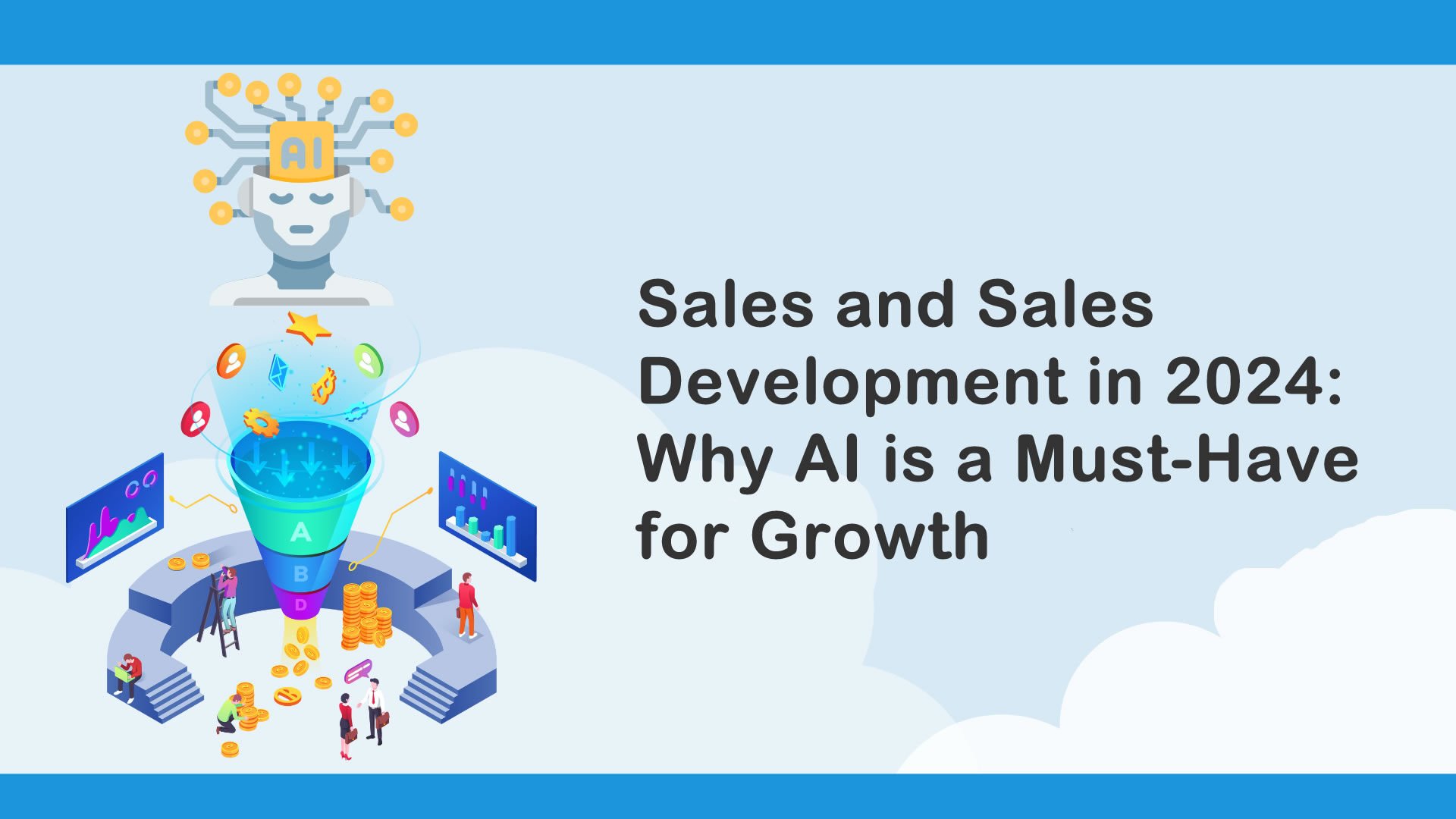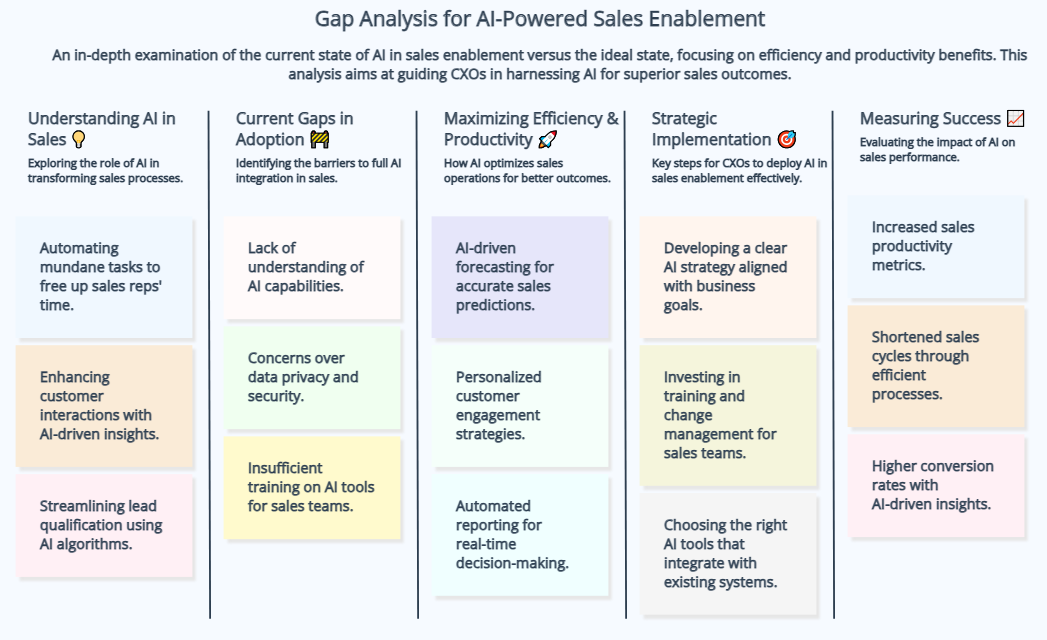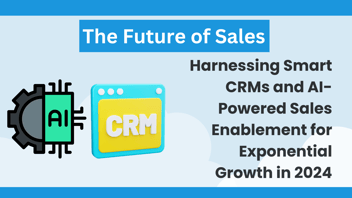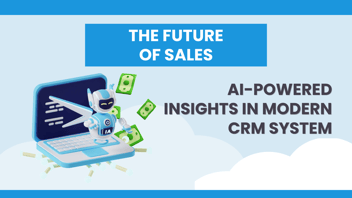Seamless integration of AI in sales processes has led to remarkable success stories and tangible benefits. According to Gartner, "By 2025, AI will drive 95% of customer interactions, providing enhanced customer experience and operational efficiency." This projection highlights the inevitability of AI's dominance in transforming customer engagement models.
The rise of AI-powered personalization is revolutionizing the sales landscape, with businesses achieving remarkable success stories and tangible benefits through seamless integration. Leading research firm Gartner projects that by 2025, a staggering 95% of customer interactions will be driven by AI, unlocking enhanced customer experiences and unprecedented operational efficiency. This shift signifies a new era where personalized interactions are not just a luxury but the cornerstone of effective sales strategies.
AI is not merely automating tasks; it's empowering sales teams to understand and connect with customers on a deeper level. McKinsey & Company reports that companies leveraging AI for sales are experiencing a significant boost in leads and appointments, increasing by nearly 50%. Additionally, AI streamlines sales operations, reducing call time by 60-70% and slashing costs by 40-60%. These figures highlight the undeniable impact AI has on the bottom line, making its adoption not just a competitive advantage, but an absolute necessity for businesses seeking to thrive in the digital age.
By harnessing the power of AI to analyze vast amounts of customer data, sales teams can now deliver hyper-personalized experiences at scale. This means tailoring interactions, messages, and offers to the unique preferences and needs of each individual customer, fostering deeper connections and driving higher conversions. In this blog post, we'll delve into the strategies and tools that empower sales professionals to leverage AI for personalized outreach, leading to increased efficiency, higher revenue, and a stronger competitive edge in the market. We'll also explore how AI is transforming the way businesses approach revenue operations, value stream optimization, and customer-centric selling to unlock unprecedented growth potential in 2024 and beyond.
Efficiency and Productivity
Gartner states, "AI is becoming a 'must-have' capability for sales teams, helping them automate repetitive tasks and focus on higher-value activities." This shift enables sales representatives to allocate more time to meaningful interactions rather than mundane administrative tasks.
Forrester reinforces this, noting, "Sales teams that have embraced AI are seeing significant improvements in productivity, with reps spending less time on administrative tasks and more time selling."
At the enterprise level, efficiency and productivity are pivotal metrics that determine the overall success and competitiveness of an organization. AI-driven tools facilitate these metrics by automating complex data analysis, streamlining workflows, and optimizing resource allocation. For instance, AI can ingest and process vast amounts of sales data to identify trends, predict outcomes, and suggest the most effective actions, thereby allowing enterprises to make data-driven decisions swiftly and accurately. This not only accelerates the sales cycle but also ensures that resources are directed towards high-impact initiatives. Moreover, AI-powered customer relationship management (CRM) systems can automate follow-up emails, schedule appointments, and manage customer interactions, resulting in a cohesive and responsive sales force. Consequently, enterprises adopting AI see a marked increase in operational efficiency and a significant boost in overall productivity, translating into higher revenue and reduced operational costs.

Benefits of AI-Powered Sales Teams
- Automated Data Entry: AI tools can automatically capture and input data into CRM systems, drastically reducing the time sales reps spend on manual data entry. This automation not only enhances accuracy but also ensures that critical information is instantly available.
- Predictive Analytics: With AI, sales teams can leverage predictive analytics to forecast market trends and customer behaviors. These insights enable more strategic decision-making, optimized resource allocation, and improved sales forecasting.
- Personalized Customer Interactions: AI-driven systems can analyze customer data to offer personalized recommendations and communication strategies. This level of customization increases customer satisfaction and the likelihood of closing sales.
- Lead Scoring and Qualification: AI algorithms can rank leads based on their likelihood to convert, allowing sales teams to prioritize high-potential prospects. This leads to a more efficient allocation of effort and resources.
- Intelligent Virtual Assistants: Virtual assistants powered by AI can handle routine inquiries, schedule meetings, and send follow-up emails. This frees up sales reps to focus on high-impact activities and engage with prospects more effectively.
- Enhanced Customer Insights: AI can sift through vast amounts of data to provide deeper insights into customer preferences, purchase history, and feedback. These insights help sales teams tailor their approach and build stronger, more meaningful relationships with clients.
- Performance Analytics: AI systems can track and analyze sales performance metrics in real-time, providing actionable feedback and identifying areas for improvement. This continuous monitoring helps sales managers drive team performance and achieve sales targets.
By incorporating these AI-driven capabilities, sales teams can achieve higher efficiency and productivity, significantly enhancing their overall performance and competitive edge in the market.
Key Benefits:
- 50% less time spent on tasks that don't make a difference (Industry Expert Interview)
- 39% higher productivity (AI Sales Software Case Study)
- 70% improvement in lead conversion rates (Aberdeen Group Study)
- 30% increase in deal closure rates (Harvard Business Review)
- 20% boost in forecast accuracy (Salesforce Research)
- 25% enhancement in customer satisfaction scores (Gartner Survey)
- 60% reduction in sales cycle time (Forrester Analysis)

Ready to Take Your Sales Strategy to the Next Level?
Explore the potential of AI in enterprise sales by integrating these cutting-edge tools and techniques into your workflow. By doing so, you'll position your team for success and stay ahead of the competition in the ever-evolving sales landscape. Implementing AI-driven solutions can be the differentiator that propels your business into a new era of efficiency and growth. Companies that harness the power of AI in their sales processes are already seeing substantial benefits—don't let your organization lag behind. Embrace the future and watch as AI transforms your approach to sales, ultimately driving superior outcomes and sustaining a competitive advantage.
The Non-Linear Journey of AI-Powered Sales Enablement

While the integration of AI into sales processes reveals quantifiable benefits, it's essential to recognize that effective AI-powered sales enablement doesn't follow a linear path. Instead, it demands a holistic approach, interweaving fundamental pillars such as Revenue Operations (RevOps), LEAN value streaming, and the best practices of a personalized approach.
Revenue Operations (RevOps)
RevOps serves as the backbone of modern sales enablement by aligning marketing, sales, and customer success teams. The seamless integration of AI enhances this alignment by promoting transparency, improving data accuracy, and facilitating collaboration across departments. With AI-enhanced RevOps, organizations can unify their go-to-market strategy, streamline processes, and ensure that all teams work synergistically towards shared revenue goals.
LEAN Value Streaming
Applying LEAN principles to sales enablement focuses on optimizing value streams to eliminate waste and enhance efficiency. AI technologies can automate repetitive tasks, but LEAN value streaming goes beyond mere automation. It involves continuously refining and improving sales processes to deliver maximum value to customers. AI tools, such as predictive analytics and intelligent process automation, are essential in identifying bottlenecks, forecasting outcomes, and allowing sales teams to focus on high-value activities that directly contribute to customer satisfaction and revenue growth.
Best Practices of a Personalized Approach
The best practices of personalization in sales cannot be overstated when it comes to AI-powered enablement. AI-driven systems support personalized customer interactions by analyzing vast amounts of data to present tailored recommendations and communication strategies for each prospect. This bespoke approach not only enhances customer experience but also increases the likelihood of conversion. AI enables sales teams to move beyond generic messaging to offer custom solutions, thereby fostering stronger, more meaningful relationships with clients.
In conclusion, the path to successful AI-powered sales enablement involves an integrative strategy combining RevOps, LEAN value streaming, and personalized customer interactions. By leveraging these multifaceted approaches, organizations can unlock the full potential of AI, achieving superior efficiency, productivity, and customer satisfaction in a dynamic market environment.
Steps to Integrate AI in Your Sales Strategy:

- Assess Your Current Sales Process: Conduct a thorough review of your existing sales workflow to identify areas that would benefit most from AI integration. Understand where automation and data analytics can streamline operations and enhance productivity.
- Choose the Right AI Tools: Select AI technologies and tools that align with your business needs and goals. Whether it's CRM automation, predictive analytics, or chatbot solutions, ensure the tools you choose can seamlessly integrate with your current systems.
- Train Your Sales Team: Equip your sales team with the necessary skills and knowledge to efficiently use AI tools. Training programs and continuous learning opportunities can help them adapt to new technologies and maximize their potential.
- Monitor and Optimize: Regularly monitor the performance of AI tools in your sales processes and make adjustments as needed. Continuously optimize your strategies based on data-driven insights and feedback from your sales team.
- Invest in Expertise: Consider hiring AI specialists or partnering with experts who can guide your AI integration journey. Their expertise can help you navigate complexities and ensure successful implementation.
By taking these steps, you can not only enhance your sales strategy but also foster a culture of innovation within your organization. The future of sales is AI—don't get left behind.
Data Quality and Integration
Data forms the backbone of any AI system. However, ensuring data quality and seamless integration can be a significant challenge. Incomplete, inconsistent, or outdated data can jeopardize the efficacy of AI algorithms. To overcome this, companies must invest in robust data management practices and ensure their data is clean, comprehensive, and up-to-date. Moreover, integrating AI solutions with existing CRM and ERP systems requires a strategic approach to ensure compatibility and maximum utility.
Change Management
The shift to AI-driven processes necessitates a change in organizational culture and employee mindset. Resistance to change is often a barrier, creating friction and hampering the integration process. Effective change management strategies, including comprehensive training programs and clear communication of AI's benefits, are critical. It is essential to involve sales teams in the transition process, addressing their concerns and demonstrating how AI can enhance their productivity and job satisfaction.
Ethical Considerations
The implementation of AI in sales also raises ethical questions regarding data privacy and the potential for biased algorithms. Companies must establish stringent data protection protocols to safeguard customer information. Additionally, transparency in AI operations is crucial to ensure that the algorithms are fair and unbiased. Ethical AI practices not only build trust with customers but also comply with regulatory standards, mitigating the risk of legal repercussions.
Increased Revenue

McKinsey highlights, "AI-powered sales tools are driving a new era of revenue growth, enabling companies to unlock hidden opportunities and close deals faster." By leveraging AI, businesses can unearth insights that drive sales efficiency and ultimately, revenue.
The New Era of Personalized Sales
We have entered a new era where the shift from bulk, one-to-many marketing initiatives to personalized approaches is more pronounced than ever. The advent of AI has been a crucial enabler in this transformation. Traditionally, personalized marketing required significant manual effort, and scalability was always a challenge. However, AI revolutionizes this landscape by allowing sales teams to create and manage an endless array of personalized processes simultaneously.
With AI-powered tools, businesses can analyze vast datasets to understand customer preferences, behaviors, and needs in real-time. These insights allow for the creation of highly targeted and bespoke communication strategies that resonate with individual prospects, enhancing engagement and driving conversions. The beauty of AI lies in its ability to automate these complex tasks, ensuring that each customer interaction is tailored and relevant without overwhelming the sales team with manual work.
This technological advancement means we are enjoying the best of both worlds—highly personalized outreach at an unprecedented scale. AI-enabled systems continuously optimize these processes, learning and adapting from each interaction to refine future engagements. This perpetual cycle of improvement ensures that personalized approaches remain effective and efficient, fostering deeper customer relationships and driving sustainable business growth.
Personalization at scale is the practice of delivering highly tailored experiences to individual customers or users across a vast audience, leveraging data and technology to achieve this level of customization efficiently and effectively.
Key Elements of Personalization at Scale:
-
Data Collection & Analysis: Gathering and processing large volumes of customer data from various sources (e.g., website
 behavior, purchase history, social media interactions) to understand individual preferences and needs.
behavior, purchase history, social media interactions) to understand individual preferences and needs. -
Advanced Analytics & AI: Employing machine learning algorithms and AI models to analyze this data, identify patterns, and generate insights to inform personalized recommendations, offers, and content.
-
Omnichannel Delivery: Delivering consistent personalized experiences across multiple channels, including websites, mobile apps, email marketing, social media, and even in-person interactions.
-
Real-Time Adaptability: Adjusting personalization strategies in real-time based on user behavior and feedback to ensure ongoing relevance and engagement.
-
Scalability: The ability to apply personalized approaches to a large customer base efficiently, using automation and technology to streamline processes.
Examples of Personalization at Scale:
- Amazon: Recommending products based on past purchases, browsing history, and similar customer behavior.
- Netflix: Suggesting shows and movies based on viewing history and individual preferences.
- Spotify: Creating personalized playlists and music recommendations based on listening habits.
- Email Marketing: Sending targeted emails with personalized product recommendations or content based on subscriber interests.
- Website Personalization: Dynamically adjusting website content (like product listings, banners, or offers) based on user demographics, location, or browsing behavior.
Why Personalization at Scale Matters:
- Enhanced Customer Experience: Tailored experiences make customers feel understood and valued, leading to increased satisfaction and loyalty.
- Increased Engagement: Personalized content and offers are more relevant to individuals, resulting in higher open rates, click-through rates, and conversions.
- Improved Sales: By offering the right products or services at the right time, personalization at scale can significantly boost sales and revenue.
- Competitive Advantage: In an increasingly crowded market, personalization at scale can differentiate businesses and foster stronger customer relationships.
Key Benefits:
- 145% increase in revenue with the same sales team (AI Sales Software Case Study)
- 2x higher contract values (AI Sales Software Case Study)
- 25% increase in close rates (AI Sales Software Case Study)
Unlocking Revenue Growth: The Power of Hyper-Personalization in Business Development

The rise of AI-powered personalization is revolutionizing the sales landscape, with businesses achieving remarkable success stories and tangible benefits through seamless integration. Leading research firm Gartner projects that by 2025, a staggering 95% of customer interactions will be driven by AI, unlocking enhanced customer experiences and unprecedented operational efficiency. This shift signifies a new era where personalized interactions are not just a luxury but the cornerstone of effective sales strategies, especially within the realm of Business Development .
In the fast-paced world of business development, where capturing and nurturing leads is paramount, AI-powered personalization is emerging as a game-changer. McKinsey & Company reports that companies leveraging AI for sales are experiencing a significant boost in leads and appointments, increasing by nearly 50%. Additionally, AI streamlines sales operations, reducing call time by 60-70% and slashing costs by 40-60%. These figures highlight the undeniable impact AI has on the bottom line, making its adoption not just a competitive advantage, but an absolute necessity for BDR teams seeking to thrive in the digital age.
By harnessing the power of AI to analyze vast amounts of prospect and customer data, BDR teams can now deliver hyper-personalized experiences at scale. This means tailoring interactions, messages, and offers to the unique preferences and needs of each individual, fostering deeper connections and driving higher conversions. In this blog post, we'll delve into the strategies and tools that empower BDX professionals to leverage AI for personalized outreach, leading to increased efficiency, higher revenue, and a stronger competitive edge in the market. We'll also explore how AI is transforming the way businesses approach revenue operations, value stream optimization, and customer-centric selling to unlock unprecedented growth potential in 2024 and beyond.
Why AI-Powered Personalization is a Game-Changer for BDX:
- Lead Generation Boost: McKinsey & Company reports that companies leveraging AI for sales see a nearly 50% increase in leads and appointments.
- Efficiency Gains: AI streamlines sales operations, reducing call time by 60-70% and slashing costs by 40-60%.
- Hyper-Personalization at Scale: AI empowers BDX teams to analyze vast amounts of data, tailoring interactions, messages, and offers to each individual's unique needs and preferences.
How AI is Revolutionizing BDX:
- Data-Driven Insights: Uncover hidden patterns and trends in customer behavior to refine your outreach strategies.
- Predictive Analytics: Anticipate customer needs and proactively offer solutions before they even ask.
- Automated Outreach: Scale your personalization efforts with AI-powered tools that craft tailored emails, messages, and even website experiences.
- Sales Forecasting: Accurately predict future sales and identify potential bottlenecks in your pipeline.
- Enhanced Customer Experience: Delivering personalized experiences at every touchpoint builds stronger relationships and drives customer loyalty.
Choosing the Right Platform: HubSpot Sales Hub Enterprise

Selecting the appropriate platform for your sales needs can significantly influence your organization's success, particularly when integrating AI and adhering to Revenue Operations (RevOps) principles. HubSpot Sales Hub Enterprise stands out as an optimal choice for enterprise businesses, offering a comprehensive suite of tools designed to enhance every facet of the sales process.
HubSpot Sales Hub Enterprise seamlessly integrates with existing systems, ensuring a unified technology stack that enhances efficiency. By providing advanced CRM capabilities, predictive analytics, and robust automation features, this platform allows sales teams to operate with greater precision and effectiveness. The platform's user-friendly interface further ensures that sales teams can quickly adapt and maximize its potential without a steep learning curve.
From a RevOps perspective, HubSpot Sales Hub Enterprise excels by promoting alignment across sales, marketing, and customer service. Its integrated data management capabilities ensure that all departments have access to accurate, real-time information, facilitating cohesive strategies and fostering accountability. Enhanced reporting tools also enable data-driven decision-making, allowing businesses to continuously optimize their sales processes and strategies.
Moreover, HubSpot Sales Hub Enterprise offers extensive customization options, making it adaptable to the unique needs of any enterprise. This flexibility ensures that the platform can support complex sales cycles and adapt to evolving business requirements, providing a sustainable solution for long-term growth.
In conclusion, for enterprise businesses aiming to revolutionize their sales strategies while adhering to the foundational principles of RevOps, HubSpot Sales Hub Enterprise is a superior choice. Its comprehensive toolset, ease of integration, and alignment capabilities make it an invaluable asset in today’s competitive market.
Conclusion
The integration of AI in sales is not just a trend—it's a revolution. By harnessing the power of AI-driven sales growth, revenue intelligence, predictive lead scoring, and more, businesses can achieve higher efficiency, increased revenue, and a competitive edge. The future of sales is undoubtedly AI, and those who fail to adapt risk being left behind.
Ready to take your sales strategy to the next level? Explore the potential of AI in enterprise sales by integrating these cutting-edge tools and techniques into your workflow. By doing so, you'll position your team for success and stay ahead of the competition in the ever-evolving sales landscape. [Request a Consultation with CETDIGIT experts]
By understanding and implementing AI in your sales processes, you can ensure your business not only survives but thrives in the digital age. The future of sales is here—don't get left behind.






Leave a Comment